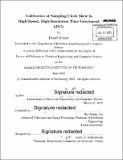Calibration of sampling clock skew in high-speed, high-resolution time-interleaved ADCs
Author(s)
Kumar, Daniel Prashanth
DownloadFull printable version (13.76Mb)
Other Contributors
Massachusetts Institute of Technology. Department of Electrical Engineering and Computer Science.
Advisor
Hae-Seung Lee.
Terms of use
Metadata
Show full item recordAbstract
There is an ever-increasing demand for high-resolution and high-resolution ADCs. In order to raise the sampling rates of ADCs in a power efficient manner, time-interleaving is an essential technique, whereby N ADC channels, each operating at a sampling frequency of fs, are used to achieve an effective conversion rate of N - fs. While time-interleaving enables higher conversion rates in a given technology, mismatch issues such as gain, offset, and sampling clock skew between channels degrade the overall time-interleaved ADC performance. Of these issues, sampling clock skew between channels is the biggest problem in high-speed and high-resolution, time-interleaved ADCs as errors due to sampling clock skew become more severe for higher input frequencies. There are a few sources of sampling clock skew between channels. Mismatches in the sampling clock path and logic delays are the most obvious ones. Input signal routing mismatch and RC mismatch of the input sampling circuits also cause sampling clock skew. In this thesis, we developed two new methods to mitigate the effects of sampling clock skew in time-interleaved ADCs. The first is the rapid consecutive sampling method, whereby each interleaved channel is implemented using two sub-channel ADCs. Two consecutive samples of the input are taken with a short time delay between them. This allows for a straight-forward linear interpolation between the consecutive samples in order to recover the de-skewed sample. The second method entails introducing a programmable delay in the input signal path, instead of delaying the sampling clock, in order to calibrate out sampling clock skew. The design and implementation of a proof-of-concept, time-interleaved ADC that implements the input signal delay method is detailed. Finally, measurement results to show the efficacy of the proposed method in mitigating the effects of sampling clock skew is also presented.
Description
Thesis: Ph. D., Massachusetts Institute of Technology, Department of Electrical Engineering and Computer Science, 2015. Cataloged from PDF version of thesis. Includes bibliographical references (pages 157-160).
Date issued
2015Department
Massachusetts Institute of Technology. Department of Electrical Engineering and Computer SciencePublisher
Massachusetts Institute of Technology
Keywords
Electrical Engineering and Computer Science.